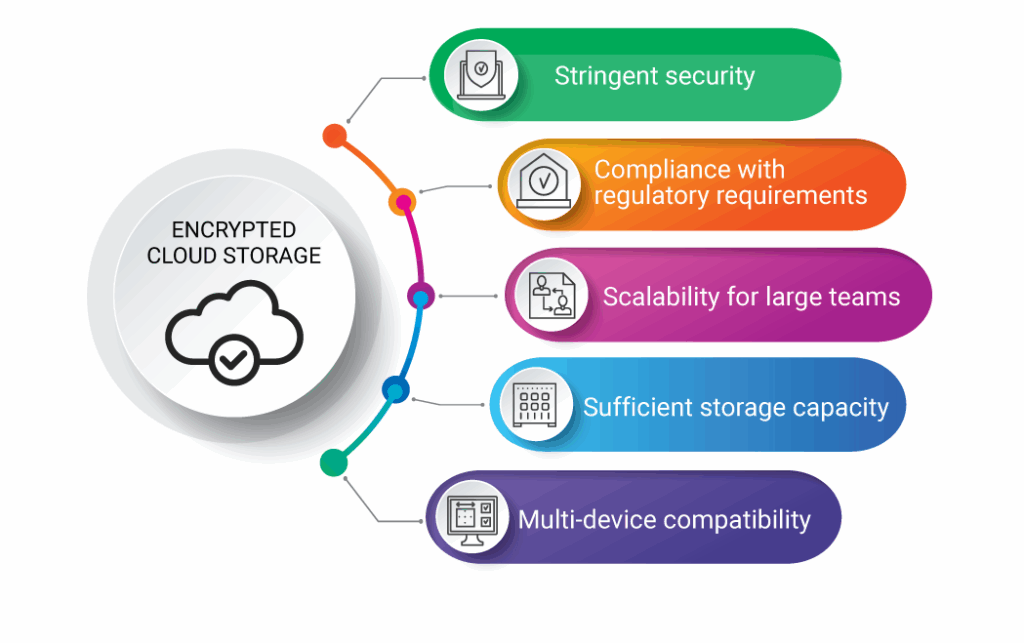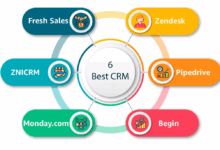Secure Cloud Storage for Enterprise: Top Solutions, Benefits & How to Buy

In today’s digital age, secure cloud storage for enterprise is no longer a luxury, but a necessity. As businesses continue to store and manage large amounts of sensitive data, the need for robust, reliable, and scalable storage solutions has skyrocketed. Companies require platforms that not only provide vast amounts of storage but also ensure the highest levels of data protection. Cloud storage helps businesses reduce overheads, improve operational efficiency, and safeguard critical information.
In this article, we will explore the top secure cloud storage solutions for enterprises, examine their features, benefits, and real-world applications, and provide guidance on how to choose the best service for your business needs. Whether you’re considering a migration to the cloud or enhancing your current infrastructure, this guide will help you make an informed decision.
What is Secure Cloud Storage for Enterprise?
Secure cloud storage for enterprise refers to cloud storage services that are specifically designed to store business data securely while offering scalability, accessibility, and integration with various enterprise applications. Unlike traditional on-premise storage, cloud storage solutions allow businesses to access their data from anywhere in the world, provided there is an internet connection.
A secure cloud storage service will typically have multiple layers of security features, such as:
- End-to-end encryption: Ensures data is encrypted during transfer and at rest.
- Data redundancy: Copies of data are stored across different servers or locations to prevent data loss.
- Access control and authentication: Only authorized personnel can access sensitive data, ensuring that there is no unauthorized access.
- Compliance with industry standards: Services are often compliant with regulations like GDPR, HIPAA, or SOC 2, which provide frameworks for maintaining data security and privacy.
With these features, secure cloud storage ensures that enterprise data remains safe, even in the face of cyber threats.
Benefits of Using Secure Cloud Storage for Enterprise
1. Enhanced Security Features
The primary benefit of using secure cloud storage for enterprise is the robust security measures that protect your data. Advanced encryption algorithms, multi-factor authentication, and regular audits help ensure that your business data is never compromised. With the increasing number of cyber-attacks, businesses cannot afford to ignore security. Cloud storage solutions ensure compliance with data protection laws and offer high levels of data protection against hacking, loss, or damage.
2. Scalability and Flexibility
Cloud storage allows enterprises to scale their storage needs according to the growth of their business. Unlike traditional storage systems that require upfront investments in hardware, cloud storage is flexible. You can increase or decrease your storage capacity based on your requirements, without the need for physical infrastructure. This makes cloud storage a cost-effective and adaptable solution for businesses of all sizes.
3. Improved Collaboration and Accessibility
With secure cloud storage, employees and teams can access critical business files and documents from any device and anywhere, improving collaboration and productivity. Remote work has become a norm for many businesses, and cloud storage ensures that team members can access the files they need to perform their jobs efficiently.
4. Disaster Recovery and Data Redundancy
One of the greatest advantages of cloud storage is its disaster recovery capabilities. Since data is stored in multiple locations, even if one server goes down, your information is still safe and accessible. Cloud storage providers typically offer automatic backup services, making it easy to restore data in case of data loss, system failure, or a cyber attack.
5. Cost Efficiency
Storing data in the cloud eliminates the need for on-premise storage infrastructure, which can be expensive to maintain and scale. With cloud storage, businesses only pay for the storage they use, which is a more economical choice, especially for small and medium enterprises.
Top Secure Cloud Storage Solutions for Enterprises
Now that we’ve covered the benefits of secure cloud storage for enterprises, let’s dive into the top solutions available today. Here are five well-regarded cloud storage providers that offer secure storage solutions tailored to enterprise needs:
1. Google Drive for Business
Google Drive for Business is a popular choice for enterprises looking for a cloud storage solution that integrates seamlessly with other Google Workspace apps like Gmail, Docs, and Sheets.
Features:
- 30 GB to unlimited storage options depending on the plan
- End-to-end encryption
- Real-time collaboration on documents
- Advanced admin controls and audit logs
- 24/7 support
Pros:
- Easy integration with Google Workspace
- Scalable storage options
- Strong security features
Cons:
- Can be expensive for small businesses
- Limited file size upload on lower plans
Price:
- Starts at $6 per user per month for Business Starter
2. Microsoft OneDrive for Business
Microsoft OneDrive for Business offers powerful cloud storage with deep integration into the Microsoft 365 ecosystem. It’s a great choice for companies already using Microsoft applications.
Features:
- 1 TB of storage per user
- File version history
- Advanced data security and encryption
- Integration with Microsoft 365 apps like Word, Excel, and PowerPoint
- Business-class support
Pros:
- Seamless Microsoft Office app integration
- Excellent for teams using Microsoft products
- Strong security protocols
Cons:
- Limited offline access in some plans
- Might be overkill for smaller teams
Price:
- Starts at $5 per user per month for the Business Basic plan
3. Dropbox Business
Dropbox Business is a widely recognized cloud storage service with a focus on simplicity and collaboration.
Features:
- Cloud storage with 3 TB to unlimited storage
- File sharing and team collaboration tools
- Advanced security features, including 256-bit AES encryption
- Integration with a variety of apps including Slack, Zoom, and Microsoft Office
- Smart sync for offline file access
Pros:
- Intuitive and easy-to-use interface
- Robust team collaboration tools
- High-level security features
Cons:
- Relatively expensive
- Storage might be overkill for small businesses
Price:
- Starts at $15 per user per month for the Standard plan
4. Box for Business
Box for Business is another excellent option for secure cloud storage, particularly suited for large organizations that require strong data governance and compliance features.
Features:
- 100 GB to unlimited storage
- High-level security and compliance features, including HIPAA, FedRAMP, and GDPR
- Real-time collaboration and content management
- Integration with enterprise apps like Salesforce and Google Workspace
- Customizable workflows and task management
Pros:
- Excellent for businesses with strict compliance requirements
- Powerful admin controls and security features
- Unlimited storage options
Cons:
- Complex user interface
- Higher price point compared to competitors
Price:
- Starts at $5 per user per month for the Business plan
5. Amazon Web Services (AWS) S3
Amazon S3 offers a highly scalable, secure cloud storage solution for enterprises. It’s ideal for companies that require flexibility and deep integration with other AWS services.
Features:
- Highly scalable storage options
- 256-bit AES encryption for data security
- Integration with AWS tools for data analytics and machine learning
- Compliance with various industry standards
- Pay-as-you-go pricing model
Pros:
- Scalable and flexible
- Strong security and compliance options
- Integration with other AWS services
Cons:
- Pricing can become complex
- Requires some technical expertise to set up
Price:
- Pricing based on usage, typically starting at $0.023 per GB for storage.
Product Comparison Table
| Product Name | Use Case | Pros | Cons | Price | Key Features |
|---|---|---|---|---|---|
| Google Drive for Business | Collaboration & Storage | Seamless Google Workspace integration | Expensive for small teams | Starts at $6 per user/month | End-to-end encryption, real-time collaboration |
| Microsoft OneDrive for Business | Microsoft app integration | Deep integration with Microsoft 365 | Limited offline access | Starts at $5 per user/month | Advanced data security, file version history |
| Dropbox Business | Team collaboration | Intuitive interface, strong security | Expensive, can be overkill for smaller teams | Starts at $15 per user/month | 256-bit AES encryption, integration with other apps |
| Box for Business | Compliance-driven storage | Strong security and compliance | Complex interface | Starts at $5 per user/month | HIPAA, FedRAMP, GDPR compliance |
| Amazon S3 | Scalable storage & integration | Highly flexible, scalable | Requires technical expertise | Pay-as-you-go | Integration with AWS tools, compliance options |
How to Buy Secure Cloud Storage for Enterprise
Choosing the right secure cloud storage solution depends on your business needs, including budget, security requirements, and integrations with other tools you use. To buy any of the services listed, follow these simple steps:
- Visit the official website of your chosen product.
- Select a pricing plan that suits your enterprise needs (most platforms offer tiered pricing).
- Sign up or log in to create your business account.
- Configure your storage settings, including user access controls and security settings.
- Start uploading your data and take advantage of the collaborative features.
Choosing the Right Secure Cloud Storage for Your Enterprise
When choosing the best secure cloud storage for your enterprise, there are several factors you need to consider to ensure the solution aligns with your business’s specific needs and objectives. Here are key considerations:
1. Security and Compliance
Security should always be your number one priority. Different industries have different requirements for data protection, and it’s important to choose a cloud storage provider that complies with relevant regulations, such as GDPR for businesses operating in the European Union, HIPAA for healthcare organizations in the United States, or SOC 2 for those in the tech sector.
Top cloud storage services like Google Drive for Business, Microsoft OneDrive for Business, and Box for Business offer high levels of encryption (256-bit AES) and meet various industry standards. Ensure the solution you choose has strong encryption protocols and robust compliance certifications to protect your sensitive data.
2. Storage Capacity and Scalability
The amount of storage your business needs will determine which service is most suitable. For small to medium-sized enterprises, 1 TB of storage may be sufficient, but large corporations with vast amounts of data may need unlimited or scalable storage options.
Cloud services like Amazon S3 provide scalability on a pay-as-you-go basis, which allows enterprises to expand their storage capacity as needed. On the other hand, services like Dropbox Business and OneDrive for Business offer a set amount of storage with the ability to upgrade as your needs grow.
3. Cost Efficiency and Budget
While secure cloud storage solutions can provide significant cost savings over on-premise solutions, pricing varies greatly depending on the features and storage capacity. It’s crucial to assess the total cost of ownership (TCO) when comparing providers. This should include setup costs, ongoing subscriptions, and any additional charges for storage expansion or premium features.
For example, Google Drive for Business starts at $6 per user per month, while Amazon S3 operates on a usage-based pricing model, which can be highly cost-effective for businesses that only need sporadic storage or have fluctuating storage requirements.
Be sure to review the pricing models carefully, considering both current and future storage needs to choose a plan that offers the best value for your enterprise.
4. Collaboration and Productivity Features
For businesses that rely on team collaboration, secure cloud storage with built-in tools for file sharing, document editing, and team communication can greatly enhance productivity. Services like Google Drive for Business and Dropbox Business are particularly known for their collaborative features, such as real-time document editing and seamless file sharing.
If collaboration is a key factor, make sure the cloud storage solution you choose allows for easy file sharing and version control, which is essential for teams working on large projects or documents.
5. Integration with Existing Systems
Most enterprises rely on various tools and software for daily operations. When selecting a cloud storage solution, it’s crucial to choose one that integrates well with your existing systems.
For example, if your business uses Microsoft 365 extensively, OneDrive for Business may be the best choice due to its seamless integration with Microsoft applications like Word, Excel, and PowerPoint. Similarly, if your team uses Slack or Salesforce, you’ll want a cloud storage provider that integrates with these platforms for easy workflow management.
How Secure Cloud Storage Solves Common Business Problems
Data Loss and System Failures
One of the most common problems businesses face is data loss due to system failures, natural disasters, or cyber-attacks. On-premise storage solutions are vulnerable to physical damage or technical failures, which can result in permanent data loss.
Solution: Cloud storage services solve this problem by storing data in multiple data centers across different locations. This redundancy ensures that even if one data center is compromised, your data will remain accessible from another location. Furthermore, with automatic backups and disaster recovery features, cloud storage services ensure your business data is safe and easy to restore in the event of a failure.
Difficulty in Scaling Storage Capacity
As your business grows, so do your storage needs. On-premise storage requires constant upgrades, which can be expensive and time-consuming. Many businesses also struggle with over-provisioning or under-provisioning storage space, leading to either wasted resources or insufficient capacity.
Solution: Cloud storage offers flexibility and scalability that traditional storage cannot match. Services like Amazon S3 and Google Drive for Business allow enterprises to scale their storage as needed, without worrying about physical infrastructure. You can adjust your storage capacity as your data requirements increase, ensuring that you only pay for what you use.
Limited Access to Data
Businesses with remote teams or employees working in different locations can struggle to access data efficiently from centralized storage systems. This lack of accessibility can hinder productivity and slow down workflows.
Solution: With cloud storage, data is accessible from any device with an internet connection. This means employees can access files, collaborate in real-time, and work seamlessly regardless of their location. For example, Dropbox Business and Google Drive for Business both allow teams to access, edit, and share documents from anywhere in the world, making remote work more efficient.
Managing and Securing Sensitive Data
Many businesses store sensitive or confidential information that needs to be protected. Ensuring that this data is kept secure from unauthorized access or cyber-attacks is a top priority.
Solution: Secure cloud storage solutions provide encryption both during transit and while stored. These services also allow businesses to implement strict access control policies, ensuring that only authorized individuals can access specific data. For instance, Box for Business offers advanced security features, including fine-grained user permissions, multi-factor authentication, and continuous monitoring to keep sensitive data protected.
High Maintenance Costs for Physical Storage
Maintaining physical storage infrastructure is costly, requiring dedicated IT staff for upkeep, as well as the cost of purchasing and maintaining hardware. This can become an ongoing financial burden for businesses, particularly small to mid-sized enterprises.
Solution: Cloud storage reduces the need for physical hardware, saving both time and money. Providers like Google Drive for Business and Microsoft OneDrive for Business offer subscription-based pricing models, meaning you only pay for the storage you use. This significantly reduces capital expenditures on hardware and maintenance costs.
Where to Buy Secure Cloud Storage for Enterprise
To purchase secure cloud storage for your enterprise, follow these steps:
- Visit the official website of the provider you’re interested in (e.g., Google Drive for Business, Dropbox Business, or Microsoft OneDrive for Business).
- Select your plan based on your storage needs, business size, and additional features required.
- Sign up for an account and complete the setup process.
- Customize your account with your preferred security settings, user access controls, and team collaboration tools.
- Start uploading and managing your files on the cloud.
These providers offer various pricing tiers, with many offering free trials so you can explore the features before making a long-term commitment.
Conclusion
Secure cloud storage is a vital tool for enterprises looking to protect their data, streamline operations, and enhance collaboration. By choosing the right provider, you can ensure that your data remains secure, accessible, and scalable as your business grows. Whether you need compliance with industry regulations, disaster recovery capabilities, or seamless integration with other business tools, secure cloud storage solutions offer a wide range of features to meet your needs.
When evaluating your options, consider security features, storage capacity, pricing, and how well the service integrates with your existing systems. Once you’ve selected the best cloud storage provider for your business, you’ll be well on your way to enjoying the benefits of flexible, reliable, and secure cloud storage.
Optimizing Your Cloud Storage for Maximum Security and Efficiency
Once you’ve chosen a secure cloud storage solution for your enterprise, the next step is to ensure that it is set up and optimized for both maximum security and efficiency. Implementing the right practices can enhance both your team’s productivity and the protection of your data. Below are some essential tips for optimizing your cloud storage setup.
1. Set Up Multi-Factor Authentication (MFA)
Multi-factor authentication (MFA) adds an additional layer of security to your cloud storage. By requiring a second form of verification—such as a phone number or email authentication code—along with the password, MFA ensures that even if a password is compromised, unauthorized access is prevented.
Ensure that your chosen provider supports MFA, and enable it for all users. Providers like Google Drive for Business, Microsoft OneDrive, and Box for Business offer built-in MFA features that you can easily configure.
2. Establish Role-Based Access Controls (RBAC)
One of the best ways to secure your data is to restrict access based on user roles within your organization. Role-Based Access Control (RBAC) allows you to define permissions for users and groups, ensuring that only authorized individuals can access specific files or folders.
For instance, if you’re using Dropbox Business, you can set permissions for individual team members, allowing them to view, edit, or share documents as necessary. This minimizes the risk of unauthorized access and data breaches.
3. Enable End-to-End Encryption
Ensure that your cloud storage provider supports end-to-end encryption (E2EE). This encryption protocol ensures that your data is encrypted on the sender’s side before it is uploaded and remains encrypted throughout the entire transfer process. Only authorized users will be able to decrypt the data once it’s received.
Most top-tier cloud storage solutions, such as Amazon S3, Google Drive, and Box, offer E2EE or similar encryption features that can keep your enterprise data safe from unauthorized access or interception.
4. Implement Regular Data Backups
Although cloud storage services like OneDrive for Business and Dropbox automatically back up your data, it is still crucial to establish your own backup schedule for added peace of mind. Regular backups reduce the chances of losing vital business data in case of technical issues or accidental deletions.
Use backup solutions that integrate with your cloud storage system to ensure that all important data is backed up regularly and can be restored when needed. Some services also allow you to set up versioning, enabling you to restore previous versions of documents if needed.
5. Monitor Usage and Activity
Monitoring activity in your cloud storage system is essential for identifying potential security risks. Set up regular audits to track who is accessing your data, what actions they are performing, and whether any suspicious activity is occurring.
Many cloud providers, including Box for Business and Google Drive, offer detailed audit logs and activity reports that provide insight into who is accessing your data and what actions they’re taking. By monitoring these logs, you can quickly identify and respond to unauthorized access or data breaches.
How to Train Your Team to Use Cloud Storage Securely
While implementing the right tools and settings is crucial, educating your team on best practices is just as important. Employee awareness and training can significantly reduce the risk of accidental data breaches, phishing attacks, and improper handling of sensitive information. Below are key strategies for training your team to use cloud storage securely:
1. Provide Security Awareness Training
Train your employees on recognizing potential security threats such as phishing attacks, malware, and social engineering tactics. Equip them with the knowledge to identify suspicious emails, unauthorized requests for sensitive information, or links that may lead to malicious websites.
Use platforms like KnowBe4 or Cofense for specialized security awareness training. Regularly test employees with simulated phishing exercises to assess their readiness and improve security awareness.
2. Encourage Strong Password Practices
One of the simplest and most effective ways to secure your cloud storage is by encouraging employees to use strong, unique passwords for their accounts. Establish a company-wide password policy that mandates the use of long, complex passwords and periodic password changes.
Consider using a Password Manager to help employees store and manage their passwords securely. This can greatly reduce the chances of weak or reused passwords compromising your cloud storage security.
3. Teach Proper File Sharing Protocols
When sharing files within the cloud, it’s important to ensure that files are only shared with individuals who need access to them. Encourage employees to use the sharing settings within cloud storage services to set permissions for file viewing, editing, and downloading.
For example, Google Drive for Business allows users to control whether files are shared publicly, privately, or with a specific group of people. Properly configuring these sharing permissions can prevent inadvertent data leaks.
4. Foster a Culture of Data Security
Data security should be treated as everyone’s responsibility. Encourage employees to adhere to data protection best practices, such as regularly updating security settings, being cautious with public Wi-Fi, and reporting any security incidents promptly.
Hosting quarterly security meetings can also help reinforce the importance of data security and ensure that everyone is on the same page regarding organizational policies.
Cloud Storage for Enterprises in the Future
As cloud technology continues to evolve, so too do the capabilities of cloud storage services. In the near future, enterprises will experience even greater benefits and enhanced security features through innovations like:
1. AI-Driven Data Security
AI and machine learning technologies are set to play a more prominent role in data security. Cloud storage providers may integrate AI-powered features to automatically detect anomalies or suspicious behavior in real time, providing enhanced threat detection and protection.
2. Improved Data Compression Technologies
As businesses continue to accumulate vast amounts of data, cloud storage providers are working on advanced data compression techniques to reduce the storage space required without sacrificing performance. This will allow enterprises to store more data while keeping costs down.
3. Edge Computing for Faster Data Access
Edge computing, where data is processed closer to the source rather than a centralized cloud server, is gaining traction. This could allow enterprises to have faster and more responsive access to their data, especially in remote locations with limited internet bandwidth.
4. Integration with Blockchain for Data Integrity
Some cloud storage services are exploring the use of blockchain technology to ensure the integrity of data. Blockchain could create an immutable record of data access and modification, providing an additional layer of trust and accountability for businesses that need to ensure data authenticity.
Choosing the right secure cloud storage solution for your enterprise is a critical decision that impacts both the security and efficiency of your operations. With robust, scalable, and secure cloud storage providers like Google Drive for Business, OneDrive for Business, Dropbox, Box, and Amazon S3, businesses can confidently store, manage, and protect their data.
By optimizing your cloud storage, training your team, and staying informed about future innovations in cloud technology, you can ensure that your enterprise remains secure, efficient, and well-prepared for the future. With proper setup, ongoing maintenance, and employee awareness, secure cloud storage can become a vital asset in safeguarding your company’s most valuable information.
Leveraging Cloud Storage for Collaboration and Productivity
As enterprises adopt cloud storage solutions, they not only benefit from enhanced security and scalability but also from improved collaboration and productivity. Cloud storage can provide teams with seamless access to files and documents, enabling them to work together in real-time, regardless of location. Let’s explore how cloud storage can foster better collaboration and increase productivity.
1. Real-Time Document Editing and Collaboration
Cloud storage solutions like Google Drive for Business, Dropbox Business, and Microsoft OneDrive provide teams with the ability to edit documents in real-time. Whether it’s a team member drafting a proposal, working on a spreadsheet, or revising a presentation, multiple users can access and collaborate on the same document simultaneously.
This feature eliminates the need for back-and-forth email exchanges or file version conflicts. Instead, all edits are synchronized, and everyone sees the most up-to-date version of a document. The ability to comment and suggest changes ensures smooth communication, making collaborative work far more efficient and reducing the risk of errors.
2. Streamlined File Sharing and Permissions
One of the significant advantages of cloud storage is the ability to easily share files with teammates, clients, and third-party collaborators, no matter where they are. Instead of sending large files through email or relying on physical storage devices, cloud storage allows files to be shared via secure links.
You can set permissions to define whether collaborators can view, comment, or edit documents, ensuring that only authorized users can make changes. For example, Google Drive enables users to set expiration dates for shared links, so access is automatically revoked when no longer needed.
For enterprises working with sensitive data, this ability to restrict access levels is crucial for maintaining security while promoting collaboration. Additionally, cloud storage platforms like Box for Business provide file version control, allowing users to restore previous versions of a document if needed.
3. Enhanced Workflow Automation
Cloud storage platforms integrate with a wide range of business tools and applications, such as CRM systems, project management software, and communication platforms. By connecting your cloud storage to these tools, you can automate workflows and reduce manual processes.
For example, Microsoft OneDrive for Business seamlessly integrates with Microsoft Teams, enabling users to store and share files within the Teams interface. Similarly, Dropbox Business integrates with tools like Slack and Trello, allowing teams to automatically store files from conversations and task boards, enhancing project management.
With cloud storage integrated into your workflow, employees spend less time navigating between tools and more time focused on delivering results.
4. Access from Any Device, Anywhere
Cloud storage allows employees to access their documents and files from virtually any device—whether it’s a laptop, smartphone, or tablet. This flexibility is particularly valuable for remote teams or employees who frequently travel for business.
For instance, Dropbox Business offers apps for both Android and iOS, allowing users to access and work on files wherever they are. The ability to sync files ensures that documents are automatically updated across devices, making it easy for teams to pick up where they left off, regardless of location.
With this level of access, employees can remain productive no matter where they are, improving both speed and efficiency in project completion.
5. Secure File Storage for Team Communication
Cloud storage is not just about storing files—it’s also about fostering secure team communication. Many cloud platforms come with integrated messaging and collaboration features. For example, Google Drive for Business allows users to add comments directly to files, ensuring that feedback is clear and organized. Similarly, Box for Business offers task management features, where you can assign tasks to team members and set deadlines.
By keeping all project-related files and conversations within the cloud platform, teams can avoid scattered emails and fragmented communication channels. This improves clarity and reduces the likelihood of missing important information.
Benefits of Cloud Storage for Enterprises
Cloud storage offers an abundance of benefits that make it an invaluable tool for enterprises. Below, we will break down some of the top advantages, focusing on how cloud storage enhances both security and productivity.
1. Cost-Effectiveness
One of the main reasons enterprises switch to cloud storage is the significant cost savings it offers. Unlike traditional on-premise storage systems, which require large upfront investments in hardware and ongoing maintenance, cloud storage operates on a subscription-based model.
This model allows businesses to pay only for the storage they use, making it more affordable and scalable. For example, Google Drive for Business starts at $6 per user per month, offering affordable plans based on your company’s needs.
With cloud storage, enterprises can reduce costs associated with purchasing hardware, hiring IT staff for maintenance, and handling data center operations, all while ensuring that data is securely stored in a highly available infrastructure.
2. Data Security and Backup
In addition to providing secure file storage, cloud storage solutions come with built-in data protection features. Most providers offer automatic data backups, encryption during both storage and transmission, and redundancy through multiple data centers across different regions.
This level of protection ensures that your data is safe from physical damage, human error, and cyber-attacks. If a file is accidentally deleted or corrupted, cloud storage services such as Dropbox Business and Google Drive for Business offer data recovery and versioning features, allowing enterprises to restore previous versions of documents and recover lost data quickly.
3. Scalability
As businesses grow, so do their data storage needs. One of the standout features of cloud storage is its ability to scale up or down depending on the needs of the business. Whether you need a few terabytes or a petabyte of data storage, cloud storage providers can accommodate your needs without the hassle of investing in more hardware.
Amazon S3, for example, allows you to pay-as-you-go, meaning you can scale up your storage capacity as your business grows. This ensures you only pay for the space you use, rather than committing to large hardware investments that may become obsolete.
4. Improved Collaboration
Cloud storage significantly enhances team collaboration, as multiple users can access, edit, and comment on files in real-time. This fosters a more efficient workflow and reduces the need for back-and-forth emails or meetings to discuss file updates.
With tools like Google Drive for Business or Dropbox Business, collaboration becomes seamless as teams can easily share files, track changes, and collaborate on documents from anywhere in the world. These tools also support version control, ensuring that the team is always working with the most up-to-date document.
5. Mobility and Flexibility
Cloud storage empowers teams with the ability to access their files anytime, anywhere, and from any device. Whether employees are working from home, on the road, or in the office, they can access the files they need to stay productive.
OneDrive for Business allows users to store files and access them via desktop, mobile devices, or web browsers, ensuring flexibility for remote workers. With this level of access, teams can stay connected and continue working regardless of their physical location.
Real-World Examples of Cloud Storage Solutions for Enterprises
Now, let’s take a deeper look at five real-world cloud storage solutions that are perfect for enterprises.
1. Google Drive for Business
- Website: Google Drive for Business
- Features: Integration with Google Workspace, file sharing, real-time collaboration, strong security, automatic file syncing.
- Pros: Affordable, integrates well with G Suite tools, strong collaboration features.
- Cons: Limited offline access, can become expensive at higher tiers.
- Price: Starts at $6 per user per month.
2. Microsoft OneDrive for Business
- Website: Microsoft OneDrive for Business
- Features: Integration with Microsoft 365, version history, real-time collaboration, file sharing.
- Pros: Seamless integration with Microsoft tools, great for businesses using Microsoft 365.
- Cons: Limited storage in lower-tier plans, advanced features are locked behind higher-tier subscriptions.
- Price: Starts at $5 per user per month.
3. Dropbox Business
- Website: Dropbox Business
- Features: File syncing, collaboration tools, version history, strong security features.
- Pros: User-friendly interface, fast syncing, great collaboration tools.
- Cons: Limited storage options in lower-tier plans, costly for larger teams.
- Price: Starts at $15 per user per month.
4. Box for Business
- Website: Box for Business
- Features: Collaboration tools, versioning, robust security features, API integrations.
- Pros: Strong compliance and security features, great for highly regulated industries.
- Cons: Steeper learning curve, higher price point.
- Price: Starts at $5 per user per month.
5. Amazon S3
- Website: Amazon S3
- Features: Scalable storage, high availability, flexible pricing model, strong security and compliance.
- Pros: Scalable, pay-as-you-go pricing, high reliability.
- Cons: Complexity in setup and management, higher cost for small businesses.
- Price: Pay-as-you-go pricing.
How to Choose the Right Cloud Storage Solution for Your Enterprise
Choosing the right cloud storage solution for your enterprise can be a complex task due to the wide range of features, prices, and capabilities available. It’s important to consider several factors before making your final decision. Here’s a breakdown of key considerations to guide you in selecting the ideal cloud storage solution for your business.
1. Security Features
Security should always be at the top of your mind when selecting a cloud storage provider. Look for cloud solutions that offer end-to-end encryption, multi-factor authentication (MFA), and data redundancy (backups across multiple data centers). These features ensure that your data remains safe and available even in the case of a breach or system failure.
Some providers, such as Box for Business, offer extensive compliance features, meeting rigorous standards such as HIPAA, SOC 2, and GDPR. This is especially important for industries that handle sensitive or regulated data.
2. Storage Capacity and Scalability
Scalability is another crucial factor to consider when choosing cloud storage. As your business grows, your storage needs will likely increase. It’s important to select a provider that offers flexible pricing models and allows you to scale up or down as needed.
Providers like Amazon S3 offer scalable storage that grows with your business. You can store a few gigabytes of data today and expand to petabytes as your needs increase. Similarly, Microsoft OneDrive offers business plans with different storage capacities, making it easier to upgrade when necessary.
3. Collaboration Tools
Cloud storage is not just about storage—it’s about collaboration. If your team needs to work on documents simultaneously, share files across departments, or provide feedback on shared files, it’s essential to choose a solution with powerful collaboration tools.
Platforms like Google Drive for Business and Dropbox Business excel in this area, offering real-time collaboration, document sharing, and commenting features. This promotes seamless teamwork, enabling employees to stay connected and work efficiently regardless of their location.
4. Integration with Other Tools
Most enterprises already use a variety of software tools for project management, communication, customer relationship management (CRM), and more. It’s important to choose a cloud storage provider that integrates smoothly with these tools.
For instance, Google Drive for Business integrates seamlessly with Google Workspace, while Microsoft OneDrive integrates with Microsoft 365 tools such as Word, Excel, and Teams. These integrations help centralize your work, reducing the need to switch between multiple applications.
5. Cost vs. Value
Price is always a factor in the decision-making process, but it should not be the sole determining factor. While affordable plans may be tempting, consider the overall value that a cloud storage solution provides. Does it meet your business’s security, scalability, collaboration, and support needs?
For example, Dropbox Business offers a comprehensive set of features, but it can be more expensive compared to other providers. On the other hand, Google Drive for Business offers solid security and collaboration features at a lower price point, making it a great choice for businesses on a budget.
Make sure to evaluate your storage needs, compare the available plans, and calculate the potential ROI based on the features and benefits provided.
Where to Buy Secure Cloud Storage Solutions
Once you’ve narrowed down your options, it’s time to figure out where to purchase your secure cloud storage solution. Many cloud storage services offer direct purchasing through their websites, while others may be available through third-party platforms or resellers.
1. Google Drive for Business
- Where to Buy: Directly from Google Workspace
- Price: Starts at $6 per user per month
- Purchase Process: Visit the Google Workspace website, select a plan, and sign up for an account. You can choose monthly or annual billing.
2. Microsoft OneDrive for Business
- Where to Buy: Directly from Microsoft
- Price: Starts at $5 per user per month
- Purchase Process: Go to the Microsoft website, choose the appropriate business plan, and sign up with your company email.
3. Dropbox Business
- Where to Buy: Visit Dropbox Business
- Price: Starts at $15 per user per month
- Purchase Process: Choose a plan on Dropbox’s website and sign up to get started with cloud storage for your business.
4. Box for Business
- Where to Buy: Directly from Box
- Price: Starts at $5 per user per month
- Purchase Process: Go to the Box website, pick your plan, and sign up for a business account.
5. Amazon S3
- Where to Buy: Available through Amazon Web Services (AWS)
- Price: Pay-as-you-go pricing
- Purchase Process: Sign up for an AWS account, and you can start using Amazon S3 right away. Pricing varies based on your usage and storage needs.
Making the Right Choice for Your Business
Choosing the right cloud storage solution is a vital decision for any enterprise. Whether you’re looking for enhanced security, scalable storage, or easy-to-use collaboration tools, the right platform will depend on your specific needs and business objectives.
- If security and compliance are a priority, Box for Business or Amazon S3 may be your best choice.
- If you need seamless collaboration features, Google Drive for Business or Dropbox Business may be the right fit.
- If you’re already using Microsoft 365, OneDrive for Business will integrate well with your existing tools and provide a seamless experience.
Be sure to evaluate each solution based on your business needs, budget, and future growth. By choosing a cloud storage provider that fits your requirements, you’ll not only ensure the safety of your data but also improve team productivity, enhance collaboration, and support your enterprise’s long-term success.
FAQ
1. Can cloud storage handle large files for an enterprise?
Yes, most cloud storage providers like Amazon S3, Box for Business, and Google Drive for Business are designed to handle large files. They support the storage of media files, high-resolution images, and large datasets. You may want to select a provider that offers features like file versioning and high transfer speeds to make working with large files easier.
2. How can cloud storage help my enterprise with disaster recovery?
Cloud storage is an excellent solution for disaster recovery because it automatically stores backups of your files in secure, remote data centers. If your physical infrastructure fails or your business experiences a data loss event, cloud storage services allow you to quickly restore data and minimize downtime.
3. Is cloud storage suitable for highly regulated industries?
Yes, many cloud storage providers meet the compliance standards required for industries like healthcare, finance, and law. Providers like Box for Business and Amazon S3 are specifically designed with compliance in mind, offering features like encryption, audit trails, and secure data handling to meet regulatory requirements.
4. Can I access my files offline using cloud storage?
Yes, many cloud storage providers offer offline access, allowing users to download files to their devices and work on them when there’s no internet connection. For instance, Google Drive and Dropbox both have mobile apps that allow offline access and automatic synchronization once you’re back online.
5. Can I integrate cloud storage with my existing business software?
Yes, most cloud storage platforms offer integrations with a variety of business software, such as CRM systems, project management tools, and email clients. Dropbox, Box, and OneDrive all offer extensive integrations with tools like Salesforce, Slack, Trello, and Microsoft Teams to streamline workflows and improve efficiency.









